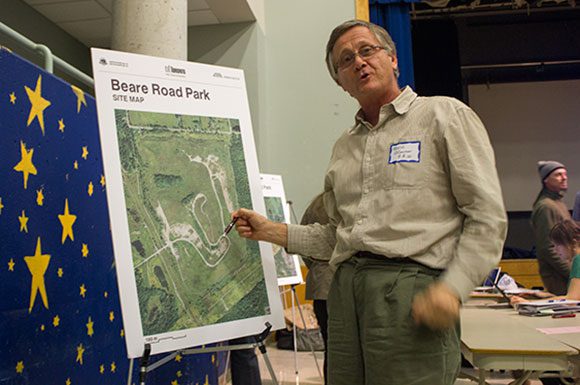Conservationists and off-road cycling advocates have been butting heads over the prospect of building mountain bike facilities in Beare Road Landfill Park.
Kevin O’Connor is the president of Friends of the Rouge Watershed (FRW), an organization concerned with conservation in and beyond the Rouge River bioregion. He and others oppose mountain biking in the park because they believe it will harm the park’s natural environment.
“If we’re planting a lot of trees and wildflowers and there’s a lot of terrain of various heights, you’re going to rip the heck out of that,” O’Connor said. “Besides which, don’t forget it’s kind of a layer cake and so if you start cutting through that, then you get erosion, that’ll expose a lot of the garbage in the landfill.”
Both sides weighed in at a public meeting, held by the city of Toronto on Oct.11. The city also prompted community members for other elements of their visions for the 80-hectare site, adjacent to the proposed Rouge National Park. City contractors are working on a master plan for the property, which has been mostly unused since the landfill closed in 1988 and since plans for a downhill ski facility fell through in the ‘90s.
A map showing the boundaries of the Beare Road Park
Former Ontario representative of the International Mountain Bike Association (IMBA), Jason Murray, learned to mountain bike in and around Rouge Park. He wants to see the city approach development with an eye towards balancing ecological and recreational opportunities.
“The major concerns about erosion – and this comes up everywhere that we build trails – usually come from poor or no trail design,” Murray said. He explained that building a trail with a “bench-cut design,” which follows the contours of the hill, would circumvent erosion problems.
If you build it properly, you maintain it and you make it an authorized use, you can manage it.
— Jason Murray
General manager and FRW co-founder, Jim Robb said that he worries about mountain biking in Beare Road Park based on his past experience with off-road cyclists and because the park is a habitat for three defined species at risk.
“I think it’d be necessary to demonstrate that there was a net benefit to the overall park and that mountain bikers were not ripping up the trails that they’re not supposed to be on, because right now there still is a lot of illegal mountain biking in the park.”
Murray believes that offering legal options for mountain bikers in the park and involving local mounting biking clubs would curtail illicit cycling.
“Well, if you build it properly, you maintain it and you make it an authorized use, you can manage it,” he said.
Robb said any development on the site must be subordinate to a focus on ecology.
“We’ve taken so much. This is a 20-year pile of probably eight to nine billion kilograms of waste,” he said. “So we’ve already extracted our pound of flesh from Mother Nature on this site, let’s make sure that for the next little while we give her back and say, ‘nature first.’”
Murray feels cyclists are being kept out of the dialogue surrounding Beare Road Park.
“We know how to do this in a way that preserves ecology, is environmentally less impactful, that can keep us away from the species at risk that everyone is concerned about,” he said. “It’s not just IMBA, you have a lot of local knowledge, right here already, that is chomping at the bit to help out. We just have to be allowed to the table, someone has to shake our hand and we’ll be off to the races.”


It is important to remember that it is more than just Friends of the Rouge that has worked to protect the valley. Groups like the Rouge Foundation Foundation and others have spent millions of dollars and tens of thousands of volunteer hours working to get the park protected initially and then helping to restore its ecology. If everyone is just going to open up the Valley system for intense public use then what was the point really. This special place will become like any other in Toronto. There are hundreds of kilometres of both hiking and cycling trails in other parts of Toronto and the GTA. Why does it also need to be here? Why does every natural space in Toronto also need to have active recreational use? Perhaps this is one place that can be different. The landfill site could be a start in a new direction.